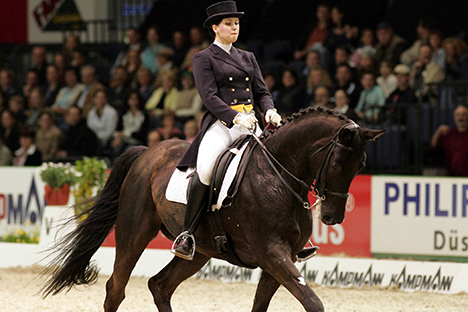Russia’s equestrian team: Galloping for Rio 2016

Russia’s equestrian team should make an impact at the 2016 Olympics. Source: Legion Media
Russia’s leading equestrian, Inessa Poturaeva, is a multi-time national champion, winner of the Central European League World Cup, a multi-time participant in the equestrian World Cup finals and the recently appointed head coach of the Russian dressage team.
Russia Beyond the Headlines: Inessa, what’s up with Russian equestrianism? We’re stumbling a bit, so to speak…
Inessa Poturaeva: If you don’t count the Moscow Olympics in 1980, Russian hasn’t won a medal in equestrianism for 40 years.
Before that, we had some really successful riders — champions — we always won or placed at international events. But the quality of equestrianism in our country has dropped since the collapse of the Soviet Union.
Many riders left to earn money abroad, and the training of horses suffered as a result.
But we’ve seen great progress over the last three years.
Equestrian sports facilities are being built and a number of riders are
returning to Russia. Even if they’re not competing themselves, they’re working
with the next generation.
RBTH: You’re the head coach of the Russian dressage team, so you know what
you’re talking about. Have you found the recipe for success with your training
methods?
I.P.: When I started working with the
national team, the horses we had were nothing special. So I decided to retire
the older horses and bring in some new blood.
BOX:
Soviet equestrians have been taking part in the Olympics since 1952. Sergei Filatov and his horse,Absent, won gold at the 1960 Games in Rome. Ivan Kizimov repeated his compatriot’s success in 1968, and went one better four years later, taking gold in the team dressage. At the Moscow Games in 1980, the Soviet equestrian team won three gold medals, three silvers and two bronzes.
It wasn’t a popular decision; there were lots of discussions, finger-pointing and questions being asked. How could I tell, for example, that a certain horse would be fit for international competition in the future, while another just wasn’t up to scratch?
But I have to say that I was right. The horses have already
started placing. It was necessary to break with the old, flawed system. If you
want to represent Russia, then you need a decent horse.
RBTH: So far, we’ve only been talking about the horses. Are the riders a
secondary consideration?
I.P.: It’s an even split. It
depends just as much on the rider as it does on the horse.
RBTH: So they have to be a tandem. It’s difficult for two human athletes to
find that kind of chemistry, never mind a human and an animal…
I.P.: Right. Individually, the horse
and the rider may be amazing, but if they don’t reach a level of mutual
understanding, then it simply won’t work. It’s such a great feeling when the
animal starts to understand, starts communicating with you — all you have to do
is listen.
There are some really intelligent horses out there: They
already know what to do before you’ve even had a chance to give a command, like
they’re listening to your thoughts. You can’t win an Olympic gold if you don’t
have one of these horses.
RBTH: Besides your preparations for the Olympic Games, you are also involved
in the Galloping to Rio de Janeiro project for amateur horse riders. How did
that idea come about?
I.P.: Russian actors and celebrities
have taken part in a number of different projects — ice-skating events, dancing
events and circus events. Now it’s the turn of equestrianism.
I was a bit nervous at first, but it turns out that actors are very motivated and hard-working. I think the project was a success.
When we were getting the show together, we wanted people to realize that equestrianism is beautiful, that it is more than just a sport — it is something that brings pleasure and enjoyment.
Judging by our Facebook page, where we’re getting 15,000 views per week, it seems to be working.
I also get calls from people in the Netherlands, the United
States and Germany who are keeping an eye on the project. They love it. A
prestigious school in France has even invited our celebrities over to give a
master class.
RBTH: What do Russians think about equestrianism?
I.P.: People always tell me that it’s
not a popular sport, that nobody goes to watch it. I don’t think that’s the
case. The problem is that there’s no advertising; we don’t get any exposure.
We had the Spasskaya Tower Festival not so long ago. Red
Square was bursting with people, and not a single one of them left early. They
had their pictures taken with us, asked us for our autographs and said things
like: “Your horses are truly magical!”
RBTH: What are our chances at the 2016 Games? Do we need a bit of magic
there as well?
I.P.: No, we’ve got a real chance.
I’m extremely optimistic about how equestrianism is developing right now. It
takes 6-7 years to get a horse ready for the Olympics. We need time, but I
think we’ll do ourselves proud in Rio.
RBTH: And will you be competing in Brazil?
I.P.: Dressage is a way of life. I ride more than I walk. Training takes up a lot of my time. Do you know that a runner-up in the equestrian World Cup was 71 years old?
I’ll only be 52 by the time the Rio Games are taking place. God willing, I’ll go to a few more games if my health doesn’t let me down.
Russian jockeys from the Kremlin Equestrian Riding School show
All rights reserved by Rossiyskaya Gazeta.
Subscribe
to our newsletter!
Get the week's best stories straight to your inbox